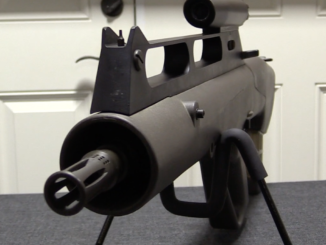Written by Josef Mötz and Joschi Schuy, “Vom Ursprung der Selbstladepistole” (Origins of the Automatic Pistol) is an absolute gold mine of information on early manually operated and self loading pistols. It is limited to Austro-Hungarian designs and is available only in German, but even so it remains an indispensable resource. From the recognized names like Mannlicher, Frommer, Bergmann or Pieper to the unknown like Vanyek, Beliczay, Kulhanek, or Warnant, this 850+ page tome is chock full of history, photos, and patent information.
There is really no need for me to go into more detail. If you are interested in early handguns, just buy a copy. You will not regret it.



From what I see, price of $125.- is not that much for this spectacular book. With respect to its orientation it may have been called: “Origins of self-loading pistol in A-H” (and if printed in English might have been a gateway to wider acceptance). German scene is separate and spectacular enough on its own, although there are some intersections. I also sense part of German and Hungarian sounding inventor names couple of Czech ones; they were all part of one empire and the same endeavour.
$125 plus importation fees? Drat and double drat!! I don’t have enough for the book after having to spend my planned holiday shopping funds on car insurance and new snow boots! What horrible timing!
“they were all part of one empire and the same endeavour.”
This simplifying too much.
Austria-Hungary case is not so simple.
In terms of foreign policy it was one thing.
However internally, Austria and Hungary were separate (parliaments).
Not to mention various other nationalities living inside.
If you want to know more see Ausgleich
https://en.wikipedia.org/wiki/Austro-Hungarian_Compromise_of_1867
Division was between Austria and Hungary by which Hungary gained equal standing. Czech deputies attended regularly Wiennese Landstag. Here is page on legislative and governance organization within A-H monarchy.
https://cs.wikipedia.org/wiki/Zemsk%C3%BD_sn%C4%9Bm_(Rakousk%C3%A9_c%C3%ADsa%C5%99stv%C3%AD)
About military – it was divided to four command circles: Krakow, Praha, Wien and Budapest.
http://enacademic.com/pictures/enwiki/77/Mapa_c.k._garnizonow_%28Landwehra%29_1898.jpg
The change of name of this Empire, as I understand it, from Habsburg, then Austrian, to Austro-Hungarian(?) reflected either the loss of central control and the growth of nationalist excused hatred; or the weakening of autocracy and the growth of national identity.
Before the First World War broke out Emperor Franz Joseph I acted as though he knew what a complete basket case his empire was, and clearly did not want a war. If Gavrilo Princip had not managed to kill Archduke Franz Ferdinand in Sarajevo, by a set of astonishing flukes, there would have been no war by August 1914, and possible no world war at all.
If WWI had not happened then I doubt the Habsburg (or the Ottoman) empires would have lasted all that long, but you cannot rule out the possibility that Bohemia, Austria, Hungary, and all the other parts of the Empire, might have developed world beating industries (including gun making(, and also evolved into nation states without the deaths of many tens of millions.
btw. I really, really hate The Good Soldier Švejk. I tried to read an english translation in my teens; and hated the character and the way it was written.
This includes lots of topics. Yes, before 1848 revolutionary year the Austrian empire was oppressive toward constituent nationalities. But during following decades, starting with Hungarian equalization, the state system became gradually more and more liberal.
When comes to Sarajevo assassination there is strong indication that this was coordinated action of international masonry; Austria was not interested in initiation of hostilities. The man behind the Black Hand terrorist group (using today’s parlance) was Serbian intelligence officer who was member of Beograd chapter.
After Franz-Joseph II death the new emperor was Karl der Erste https://en.wikipedia.org/wiki/Charles_I_of_Austria
He made attempt to convert ailing and defeated monarchy into multinational confederation. He even went so far to hire independent Romanian lawyer to prepare concept of constitution. However, victorious powers did not have interest in this direction and effort was scuttled. Karl Ist died young in exile.
Story of D.Dimitrijevic, professional conspirator (not a theory in this case) https://en.wikipedia.org/wiki/Dragutin_Dimitrijevi%C4%87
He ended up in June of 1917 in front of firing squad. Justice is done, time by time.
“Advantures of Good soldier Svejk” is a satira intended as anti-war agitation; it does not have tangible historical value. It was concocted after the war by people with strong leftist-anarchist leaning. Unfortunately, it gave (to some degree) false image of lack of Czech determination to fight when comes to crises. Czech&Slovak soldiers shower clearly their determination during September 1938 crisis.
“I really, really hate The Good Soldier Švejk. I tried to read an english translation in my teens; and hated the character and the way it was written.”
It is comment of times in which Hašek lived, in modern times it might be not fully understandables as he wanted.
Anyway Adventures… were used several time in movie-making and several time as inspiration, for example: http://www.imdb.com/title/tt0110348/
Exact anti-thesis to clownish jerk Shveik was gen. Radola Gajda. He experienced first hand civil war in Russia in wake of Bolshevik revolution. He is, depending on point of view, described as either hero or villain. I came to first to know about him as teen when I gained access (from my grandpa war book library) to books with his first name as title. What a reading!
https://en.wikipedia.org/wiki/Radola_Gajda
https://legacy.blisty.cz/art/43092.html
See also https://en.wikipedia.org/wiki/Sergei_Wojciechowski
(important person during Great Siberian Ice March)
“there would have been no war by August 1914, and possible no world war at all.”
First is possible, in second in doubt.
Death of archduke was only pretext, even without it there were some disputes.
Citing http://www.historyhome.co.uk/europe/causeww1.htm
The Austrians decided that they would have to wage a preventative war against Serbia in order to destroy her growing power. They were waiting for the correct pretext (excuse).
Chart on right hand side states as reasons of war “rivalries” and that is indeed true. These were on top of it rivalries among relatives; among three major empires houses. Most importantly, Germany’s power was rising while Britain’s was waning; something had to be done to correct it. Russian interests in Balkans was a factor, but not a major cause to breakup of delicate balance. Shots fired in Sarajevo were casus belli to something which had long standing and growing cause. G.Princip was a ‘patsy’, just like his later follow-up LHO.
What is of major interest however is that three empires were destroyed while a single one was preserved and it has arguably still dominant position to this day. All indicates that war plotters knew rather well what their goal was. Conduct was almost impeccable with one inherent fault – 10 millions dead and many more in form of Spanish flue right after.
Austrian Habsburg house had not so much Serbia as their opponent; for one thing Serbia was backward regional kingdom, just like Bulgaria or Romania or even Greece. She was no real threat to much larger and incomparably more advanced A-H.
Who was perennial threat to Austrian interests and even directly to members of her royal family were Italian nationalistic radicals; they conducted in time numerous attempts on Habsburgs, some successful. It is understandable that Italian nationalists had seen Austria as an obstacle to achieving of their budding national ambition – Austria had strong historical political and military influence in Apennine peninsula. You can say, that as with many other cases of territorial claims, it was burden inherited from middle ages. The WWI was one way out of these obligations.
Ian, every time you post a book review it cost me money.